The 66th London Film Festival is in full swing this October, presenting over 160 new features and shorts, VR works and previews of prestige TV on the big screen – with a few films also available nationwide on streaming service BFI Player after the festival’s close.
There are plentiful red carpet ceremonies, career talks with legends and screaming Timothée Chalamet fans. But what of the films themselves? In alphabetical order, here are ten of the best features from this year’s LFF.
1976 (Manuela Martelli)
Before making Spencer (2021) and Jackie (2016), Chilean director Pablo Larraín’s early films, tales of men in his homeland navigating the Pinochet dictatorship, gained international acclaim. Operating in a similar thriller mode to many of those films, debut director Manuela Martelli’s 1976 presents a refreshingly female-centric spin on the formula. A bourgeois housewife (Aline Küppenheim) becomes a spy after agreeing to a favour for a local priest while renovating her summer beach home. But whether she’s kicking back against the patriarchal forces she regularly experiences first-hand, or whether she’s doing it for larger political reasons is left enjoyably ambiguous to the viewer.
Blue Jean (Georgia Oakley)
A soulful, sincere and self-assured debut from writer-director Georgia Oakley, Blue Jean is an 80s Britain-set period piece that’s all too relevant to today. As Section 28 is introduced, P.E. teacher Jean (a magnetic Rosy McEwen) finds it increasingly difficult balancing professional and personal lives that she keeps separate. No one at work knows she’s gay, or that she frequents the local lesbian bar with friends and her long-term partner. But the arrival of a new student who also starts visiting the same bar threatens to make her private life public. While dealing with the oppression of Tory rule and the sadness of silencing, the film also presents the hope stemming from grassroots community support.
Bones and All (Luca Guadagnino)
Bloody and tender, Luca Guadagnino’s adaptation of Camille DeAngelis’s novel about young cannibals touring America’s backroads is an empathetic, occasionally unsteady affair. It’s definitely not for the squeamish, either. Guadagnino’s returning Call Me by Your Name pair Timothée Chalamet and Michael Stuhlbarg shine in their respective roles, but this definitely belongs to the incredible Taylor Russell, who plays a teenage cannibal on a road trip to find her mother.

Brother (Clement Virgo)
A time-jumping portrait of two West Indian-Canadian brothers in Toronto, spanning from the late 80s to the early 2000s, Brother is an astonishing story of unconditional familial love, mental illness, grief, and navigating societal structures that seem focused on putting you in prison or in the ground. If there’s any justice, its stars Aaron Pierre, Lamar Johnson and Kiana Madeira will be megastars.
Hidden Letters (Violet Du Feng, Zhao Qing)
Only properly discovered in the 80s, Nushu is an ancient script used by silenced Chinese women to communicate with each other in a period when they were forbidden to read or write, often scribed on tiny items like handkerchiefs. The roots and current commercial commodification of the unearthed language are compellingly explored in this documentary, which also examines how two millennial practitioners of Nushu still face obstacles concerning women’s liberation.

Liquor Store Dreams (So Yun Um)
This deeply personal documentary explores the cultural legacy and politics of Korean-owned liquor stores in the United States, through the lens of director So Yun Um’s own experiences as the daughter of Los Angeles-based store owners. Shot over four years, the film ended up documenting her family’s store’s challenges during the pandemic peaks, as well as the Black Lives Matter protests of summer 2020. A big story told through a small canvas.
One Fine Morning (Mia Hansen-Løve)
With such works as Goodbye First Love (2011), Eden (2014) and Things to Come (2016), writer-director Mia Hansen-Løve is a proven master of the deceptively simple heartbreaker. She makes films with melodramatic narratives that bypass the expected hysterics and shouting matches of the genre in favour of the quiet moments in between the life-changing events. Her beautiful Léa Seydoux-led latest only further cements that reputation.
Piaffe (Ann Oren)
The debut feature of visual artist Ann Oren, Piaffe is probably the year’s best erotic experimental film in which a woman grows a horse tail that seems to function as a new sexual organ. Many body horrors explore the scary side of growing new limbs, but this Berlin-set tale, which favours abstract mood over detailed plot, goes in a rare opposite direction: what if an introverted young woman (Simone Bucio) felt empowered by a mysterious hairy appendage, using it to lure a crush into an affair based around submissive foreplay? Sensually shot on super 16mm film, the lead character’s sound effects job also means the movie’s an ASMR fan’s dream.
Small, Slow But Steady (Sho Miyake)
This calm and collected Japanese boxing drama, gorgeously shot on 16mm film, subverts almost all sports movie cliches while never coming across as being smugly above such formulas. Less a story of career triumph, it’s more about finding peace of mind in a professional arena; where being the best is less important than the thrill of feeling alive through the participation. It’s also very smart about incorporating the pandemic on a plot and emotional level: in it, the lead character, a boxer who is deaf, is reliant on lip reading to understand people, and is presented with new obstacles when navigating spaces.
The Worst Ones (Lise Akoka, Romane Gueret)
This meta, satirical French drama takes an incisive look at the concept of filmmakers casting newcomers and the framing of ‘poverty porn’, as a Belgian writer-director clashes with the untrained teenagers he’s cast in his new movie, as well as the local community of the northern French housing estate where he’s set his tale of teenage pregnancy and abandonment. A sharp-witted, meta portrait of filmmaking camaraderie and conflict.
